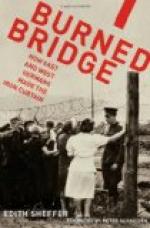Thompson, through sleep-heavy eyes, saw Carr hold a glass of port wine, glowing like a ruby, up between himself and the light and sip it slowly. Carr was partial to that wine. Wonder if the old chap didn’t get properly lit up sometimes? He looked as if—well, as if he enjoyed easy living—easy drinking. There was brandy and soda and a bottle of Scotch on the sideboard too.—And Sophie was beautiful. All the little feminine artifices of civilization accentuated the charm that had been potent enough in the woods. Silk instead of gingham. Dainty shoes instead of buckskin moccasins.—What an Aladdin’s lamp money was, anyway. Funny that they had settled upon Vancouver for a home. Tommy was there too. Of course. Should a fellow stick to his hunch? Vancouver might give birth to an opportunity. Profitable undertakings.—At any rate he would see her now and then. But would he—working? Did he want to? Would a cat continue to stare at a king if the king’s crown rather dazzled the cat’s eyes? Suppose—just suppose—
Thompson sat up in bed with a start. It seemed to him that he had just lain down, that the train of his thought was still racing. But it was broad day, a dull morning, gloomy with that high fog which in spring often rides over the city and the bay till near noon.
He stretched his arms, yawning. All at once he recollected that he had something to do, a call to make upon Mr. John P. Henderson at ten o’clock. Groya Motors—he wondered what significance that held. At any rate he proposed to see.
It lacked just forty minutes of the appointed time. Thompson bounced out of bed. Within twenty minutes he had swallowed a cup of coffee at a near-by lunch counter and was on his way up Van Ness.
The corner of Van Ness and Potter revealed a six-story concrete building, its plate-glass frontage upon the sidewalk displaying three or four beautifully finished automobiles upon a polished oak floor. The sign across the front bore the heraldry of the card. He walked in, accosted the first man he saw, and was waved to a flight of stairs reaching a mezzanine floor. Gaining that he discovered in a short corridor a door bearing upon its name-plate the legend:
Mr. John P. Henderson.
Private.
Thompson looked at his watch. It lacked but two minutes of ten. He knocked, and a voice bade him enter. He found himself face to face with the master of the gray car. Mr. John P. Henderson looked more imposing behind a mahogany desk than he did on the street. He had a heavy jaw and a forehead-crinkling way of looking at a man. And—although Thompson knew nothing of the fact and at the moment would not have cared a whoop—John P. was just about the biggest toad in San Francisco’s automobile puddle. He had started in business on little but his nerve and made himself a fortune. It was being whispered along the Row that John P. was organizing to manufacture cars as well as sell them—and that was a long look ahead for the Pacific coast.




